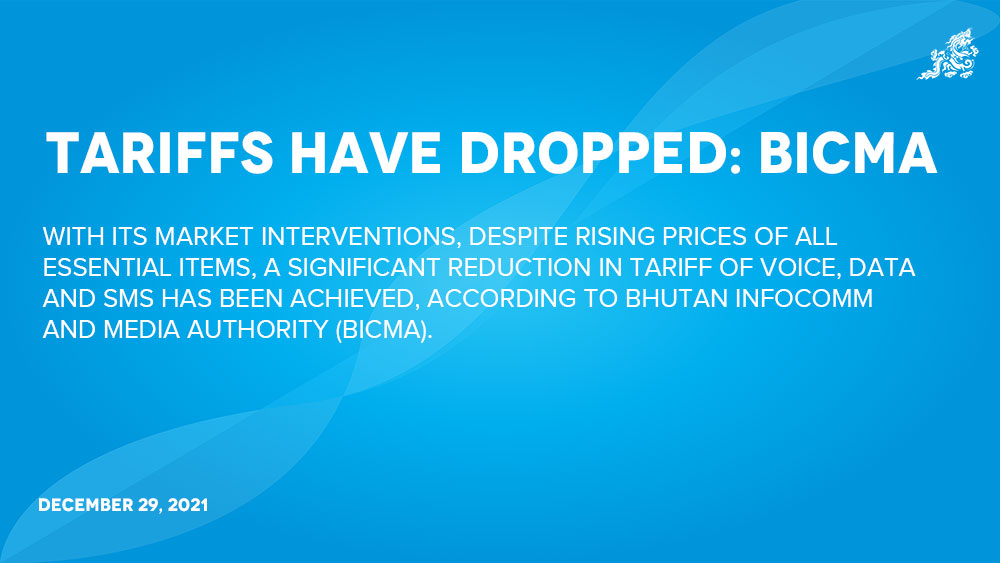Staff Reporter
With its market interventions, despite rising prices of all essential items, a significant reduction in tariff of voice, data and SMS has been achieved, according to Bhutan InfoComm and Media Authority (BICMA).
From 2017 to 2020 (12 FYP) the internet data tariff has been reduced by 40 percent and voice rate 10 percent and SMS by 20.95 percent. “BICMA shall continue to regulate tariffs and when feasible shall ensure reduction based on the market situation,” the authority stated.
It stated that the decrease in price per MB of both B-mobile and Tashicell prepaid services from 2017 to 2020 (12 Plan) has been evaluated by the BICMA and this is one of the outcomes of its tariff reduction initiatives.
Internet tariffs are proposed and implemented by the telecom service providers or other internet service providers as per their business plans and market dynamics. However, by regulation, any tariffs of the ICT services and in particular, the tariffs of the telecom services, are implemented by the operators only upon review and approval by BICMA.
The approved tariffs are shared to the public by the operators on their websites for information to the public as required by BICMA and which is monitored regularly, the authority stated.
In terms of affordability as per the recent International Telecommunication Union study report, Bhutan is ranked 64th in the world and third in the South Asian region after Sri Lanka and Pakistan.
To assess actual data quota for broadband and mobile services is provided to customers, tariff monitoring mechanisms have been instituted, BICMA stated, adding that it also verifies whether the telecom operators are providing the voice and data services as per the approved tariff rates.
Two Multi-Service Operators (MSOs) were given licenses to provide high definition (HD) quality cable services with uniform channels across the country. The MSOs are connecting the Cable Operators in all the Dzongkhags phase-wise and are expected to complete by the end of 2022.
“However, the transition to digital cable television is faced with daunting challenges such as lack of technical expertise and awareness on the benefits of digital over the analogue system,” the authority stated. “Given the remoteness of many places, connecting with cable television services is a huge challenge for the small Cable Operators.”
The lack of fibre connections in remote places has become the biggest challenge for MSOs. Currently, the cable operators are using bandwidth leased from telecom operators to digitise the cable television service in the gewogs which is not only costly but also faced with inadequate required bandwidth to carry the HD channels.
The cable operators have to maintain a record of complaints received and resolved and submit to BICMA failing which the service provider face consequences including revocation of license. BICMA officials, the release stated, monitor social media to track any complaints and address them in consultation with the cable operators.
To address consumer grievances, numerous options are made available including its website, and social media accounts.
The ICT and Media Service providers have to abide by Consumer Protection Code for ICT and Media Services 2021.


